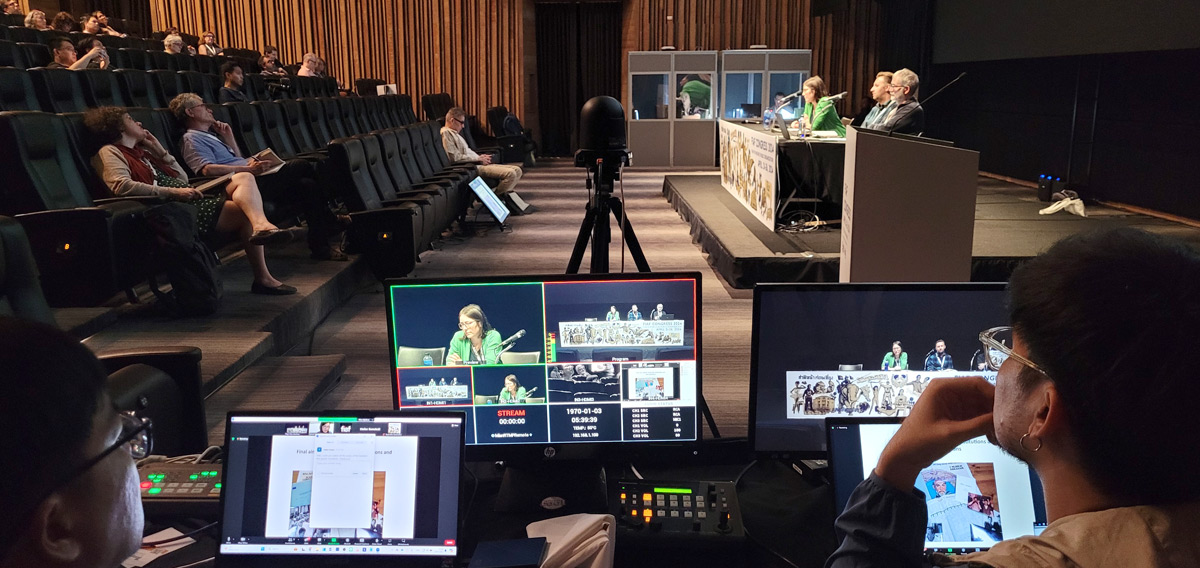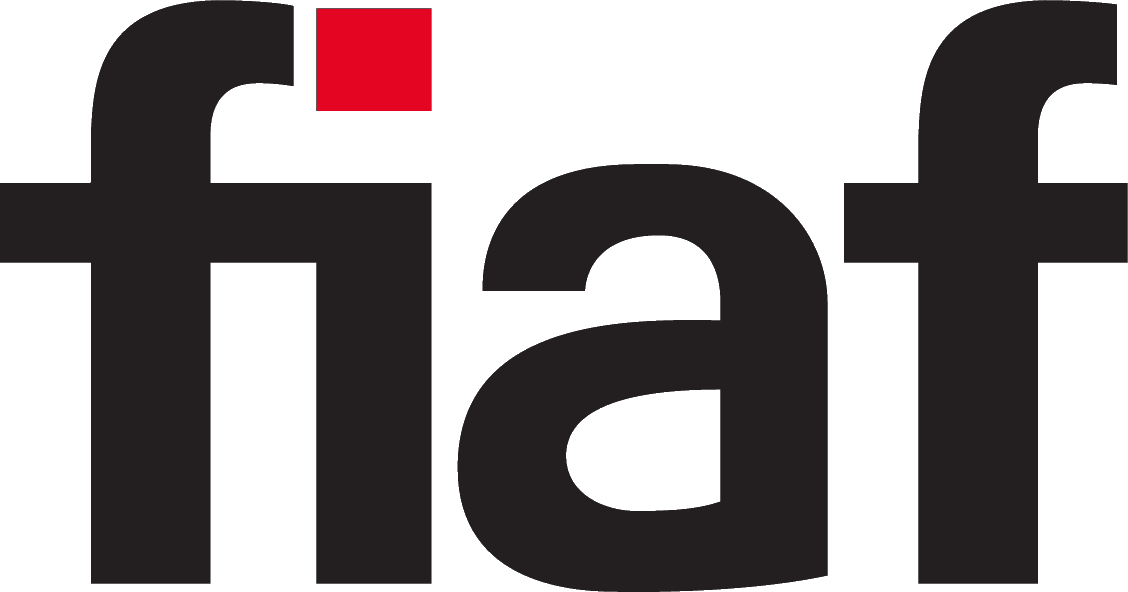 A session of the 2024 FIAF Congress in Bangkok
A session of the 2024 FIAF Congress in Bangkok
Guidelines for Affiliates Hosting the FIAF Congress
The organization of a FIAF Congress is a unique opportunity for any affiliate to affirm its place within our worldwide community and to promote its activities to its peers. It is also an undertaking which is becoming increasingly complex, as FIAF grows in size. This Guide does not pretend to cover every conceivable detail in the arranging of an efficient, smooth-running Congress. Each location and each symposium presents its own opportunities and its own challenges, and requirements may differ greatly from year to year. FIAF relies on the local knowledge and common sense of the host to ensure that particular problems or issues are handled in an appropriate way. The Federation expects a Congress to reflect the local circumstances and traditions of its host, and values such variations as evidence of its truly international nature. Nevertheless, the experience of over 80 Congresses has taught FIAF that careful advance planning is essential to avoid mistakes, which can either disrupt the Congress or lead to costly last-minute arrangements or changes in the programme.
This Guide seeks to share the fruits of some of that experience, as well as laying down certain minimum criteria which must be met for a Congress and its symposia to be judged a success. Although the Guidelines which follow may appear to place the organization of a Congress beyond the means of a young or small archive, that is not the case. It is possible to host a Congress with modest resources if the planning is thorough and if the FIAF Executive Committee and the Senior Administrator are kept fully informed, so that there is ample time to discuss and agree on any necessary and acceptable compromises. Arrangements for previous Congresses are not a definitive guide to what is expected. FIAF and its affiliates have indeed been fortunate in the generous hospitality extended by some hosts in recent years. Nonetheless, the point of a Congress is not to benefit from hospitality, but to conduct the business of the Federation and to learn from the symposia, workshops, and other events organized during the Congress. The following checklist of necessary facilities covers the items which an archive should consider carefully before submitting an invitation.
THE APPLICATION
1. Applications, in the form of a letter to the FIAF Executive Committee addressed to the Secretariat, should be submitted at least four full years ahead of the date proposed. If at all possible, the applicant should indicate alternative years which would be acceptable. Applicants who wish to host a Congress to mark an anniversary or to coincide with some other event should give as much notice as possible.
2. The application should indicate when and where the Congress will be held, and should be accompanied, where appropriate, by clear evidence of the support the application has received from governmental and cultural organizations within the country. If the archive is part of a larger organization, the application should confirm the support of that organization for the application. If possible, written assurances of support (financial and other) should be provided.
3. The application should provide the Executive Committee with sufficient detail as to the physical arrangements and the proposed programme to enable it to evaluate the invitation properly and to recommend action to the General Assembly. All financial details, such as the availability of travel grants, subsidies for accommodation, support for delegates from developing countries, assistance with secretarial costs such as translation, etc., should be included if known at the time of the application.
4. The application should include proposals for a programme of a symposium, which will (after approval by the General Assembly) be developed in consultation with the Executive Committee. FIAF’s specialist Commissions are required to be fully engaged with Congress hosts as appropriate, remembering that Commissions have their own budgets which may in part be applied to this end. The Congress should include a half-day Second Century Forum, the topic of which is the responsibility of the Executive Committee.
5. The application must contain assurances, normally obtained after consultation with the appropriate authorities in the host country, that all members and affiliates of FIAF will be granted visas to enter that country. FIAF recognizes that it may be impossible to guarantee that visas will be issued, especially two or more years in advance, but the applicant must advise the Executive Committee if there is any reason to believe there will be any difficulties in this regard.
6. Once an archive’s formal invitation to host the Congress has been accepted by a majority vote of the General Assembly, generally three years before the Congress is due to take place, the applicant will be required to present to the Executive Committee an provisional organizational plan for the Congress two years before the proposed date, and a near-definitive one one year before the Congress. Where an unacceptable plan is presented, the Executive Committee may give itself the option to cancel the proposed Congress without further compensation to the applicant. The applicant will also be expected to report progress on the organization of the Congress to the General Assembly each year preceding the Congress concerned.
7. The formal responsibility of the EC in general and the Secretary-General in particular for the aspects of a Congress which involve the General Assembly are defined by Rule 27 of FIAF’s Statutes and Rules. The Secretary-General and the Senior Administrator in Brussels should be kept closely informed at all stages of progress or problems in the preparation of the Congress, and be involved as appropriate. A visit by a representative of the EC or the Senior Administrator to the proposed Congress location some months prior to the Congress is desirable, to review facilities and discuss outstanding issues. The Senior Administrator and the FIAF Secretariat staff will also take part in the administration of the Congress while it is in progress (see Point 11 below).
8. The successful applicant will be required to provide regular reports to colleagues in the Federation through the medium of newsletters issued either directly by the host or through the FIAF Secretariat during the year leading up to the Congress. The precise number of newsletters issued is a matter for local decision, but normally at least three are required:
Newsletter 1, issued at the preceding Congress, should give the agreed dates of the Congress, the topics for the symposium, etc., and general information on visa requirements, etc., for the host country, as well as details of any concessionary travel arrangements which are being negotiated.
Newsletter 2, commonly combined with the issue of registration forms, should give specific details about accommodation arrangements and confirm any relevant details about travel arrangements, as well as providing an update on the proposed timetable of the Congress and information on its content.
Newsletter 3, issued a month or so before the Congress, should give delegates information useful to the planning of their stay (for example, details of transport from airport to accommodation; indications of local climate, etc.), as well as a further update on Congress content. A reminder to delegates to ensure they are covered by adequate personal insurance during their visit should usually be included.
A Congress website must be created ahead of the Congress. The hosting archive(s) is/are expected to supply at least the basic graphics concept and the rough information; the FIAF Secretariat can, at the request of the hosting archive, host and update it on the FIAF website. The hosting archive can also create its own Congress website.
THE SITE
Congresses should ideally be located within or close to the premises of the host archive. Where an alternative location is proposed, it should (a) be for a special and relevant reason and (b) be able to provide all desirable Congress facilities, including those described in Point 13 below. In discussing the physical arrangements for the Congress, the application should consider the following conditions:
9. The Congress should, if possible, be located in a building or complex which is self-contained – in other words, with accommodation, catering, meeting and projection facilities all under one roof. Failing this, all such facilities should be within easy walking distance of each other. Where this condition cannot be met, applicants must explain in detail the proposed transport arrangements. Premises to be used for a Congress must comply with relevant standards for fire and other safety precautions and be covered by appropriate personal and third party insurance.
10. The main meeting of the Congress hall will require seating for at least 250/300 people, with facilities for simultaneous translation and accommodation for translators (see Point 14 below). A raised stage or podium for those officiating over sessions of the General Assembly or at a symposium is essential; a lectern for symposium speakers may be appropriate in some halls (for example, to the side of a screen to give unobstructed views of projected material). If possible, the seats provided for delegates in the body of the hall should have tables or other writing surfaces. Smaller meeting rooms will also be required for concurrent meetings of regional or other special-interest groups. Simultaneous translation is not normally expected in small meetings.
11. A workroom for the Secretariat adjacent to the main meeting hall must be provided, to be shared between local support staff and staff from the Brussels Secretariat. The workroom must be equipped at a minimum with a telephone, two computers, printing and photocopying facilities, and Internet access. The same room, or another site close by, should provide sufficient clearly labelled facilities (“pigeonholes”) for the circulation of papers and mail to those attending the Congress. Free wifi should be provided for all delegates in and around the main Congress hall.
12. Hosts are reminded that accommodation and a meeting room for the Executive Committee must also be provided for the two days prior to the Congress, and for additional meetings during or after the Congress as agreed between the host and the Executive Committee. The particular requirements of Executive Committee meetings are addressed in a separate document.
13. Applicants must remember that FIAF is a Federation of Film Archives: it is expected that facilities for the projection of film will be available to delegates at appropriate points in the Congress. The decision whether or not a Congress is to be accompanied by a programme of evening screenings, and the subject matter of each symposium or workshop, will determine the technical facilities which are desirable in every case. The availability of appropriate equipment and of the technicians necessary to operate such equipment should be clearly indicated in the “organizational plan” (see Point 6 above). If the technical possibilities of the main meeting hall are too restricted, consideration should be given to holding screenings, symposium sessions, or workshops in other locations, with transport being provided if necessary. Where projection facilities are limited to particular gauges, etc., the Executive Committee must be informed as soon as possible so that symposium or workshop topics can be adjusted and participants warned of limitations.
14. Simultaneous translation must be available in all General Assembly sessions and in plenary symposium sessions between, at a minimum, French, English, Spanish, and the language of the host country when it is not one of the official FIAF languages. Special requirements for symposium speakers using another language may need to be considered. Interpreters should be accommodated in soundproof booths with good sightlines to all speakers, including those on the floor.
15. The host is required to provide for the continuous audiotape recording of all General Assembly sessions, including interventions from the floor. Microphones for such interventions (as well as microphones for platform or lectern speakers) must be provided, and the recording system must be staffed by competent technicians. Symposium proceedings may also need to be recorded on the same basis when publication is envisaged.
16. Except when accommodation is provided by the host, there should be a range of accommodation on offer, or accommodation at a negotiated price which sets all the rooms at the median level for hotels in that community.
17. Catering arrangements should plan for coffee breaks at the mid-point of morning or afternoon sessions, and for a lunch break in the middle of all-day sessions. Wherever possible, meal tickets for a set lunch should be arranged so as to minimize the amount of time required for the lunch break.
THE COST
18. The application should be as explicit as possible on the question of cost. In particular, the expenses to be absorbed by the host and those expected to be absorbed by FIAF must be frankly and freely discussed. Estimates of the known costs to FIAF should be provided wherever possible, and areas in doubt should be indicated and a timetable suggested when the costs will be determined. The financial position must be unambiguous by the time of the “organizational plan” (see Point 6 above).
19. FIAF itself makes a financial contribution to the running of a Congress on which the host may draw once the invitation has been formally accepted by the Executive Committee and presented at the preceding Congress (see Point 6 above). As of 2018, the level of contribution by the Federation to Congress expenses is fixed at 25,000 €, including translation services.
20. If there are potential sources of funding available (grants, partial or full subsidies, shared costs, etc.), these should be indicated and a timetable suggested when proposals must be made, a decision will be known, and so on. Points requiring action by the Executive Committee must be clearly indicated.
21. If a symposium is to be organized jointly by FIAF and an organization or organizations in the host country, or another international organization, the proposed arrangements on cost-sharing, on programme determination, on the publication of proceedings (if this is envisaged), and all other relevant details should be clearly indicated.
22. Applicants should also give a realistic appraisal of their expectations in the area of sponsorship by commercial or private bodies, backed up by documentary evidence whenever possible. In particular, the Executive Committee will expect to be fully informed of the nature of the business conducted by any potential sponsor, and the type of “quid pro quo” which may be offered in return for sponsorship. The Executive Committee must reserve the right to veto any proposal for sponsorship which it feels may compromise the reputation or principles of the Federation.
EXTRA FACILITIES
As noted in the preamble to these Guidelines, the purpose of a Congress is to conduct the business of the Federation and to share knowledge through the medium of symposia, workshops, etc. A Congress which has fulfilled these functions is a good Congress. The following notes describe some additional facilities which have been provided at recent Congresses, but which are not essential.
23. Social programme Delegates to a FIAF Congress will welcome the opportunity to meet and talk in an informal setting, and many Congresses have offered a social programme featuring, for example, an opening or a closing reception. These provide an opportunity for cost-sharing or for sponsorship, and may be arranged without adding greatly to the burden or the budget of the Congress. Hosts are reminded that FIAF tends to prefer relatively informal gatherings.
24. Excursions Many delegates to a Congress will welcome an opportunity to visit the premises of the host archive, to see its facilities and to meet its staff. Where a Congress takes place in a city which has more than one FIAF affiliate, visits should be offered to all those who are willing to receive them. Such visits should be arranged so that they do not disrupt the main programme of the Congress, and so that they do not place an undue burden on the organizations receiving them. Many hosts at recent Congresses have also offered excursions to important natural or historic sites away from the Congress location. While such excursions are much appreciated when offered, they are not an essential part of the programme. Nor do they have to happen in the middle of the Congress week. Delegates may be equally happy just to be offered a day or half a day to explore the immediate surroundings of the Congress location on their own, or simply to relax or pursue some shopping.
25. Congress Identity Many recent Congresses have been characterized by beautiful designs, registered on Congress stationery, posters, and on the “Congress bag” provided to delegates to carry their papers, etc. Again, it is stressed that none of this extra material is essential to the organization of a good Congress.
The FIAF Senior Administrator and the staff of the FIAF Secretariat will be happy to provide further guidance for all applicants or would-be applicants at all stages of the process from first consideration of issuing an invitation through to the closure of a successful Congress. It can make available examples of the procedures and materials used in previous years, and act as a means for sharing experiences of former hosts.
Please contact the FIAF Secretariat if you have any further questions.





